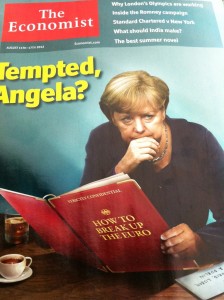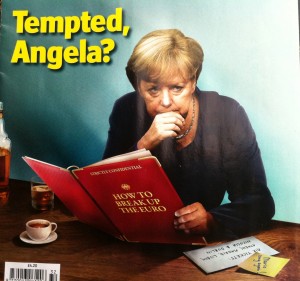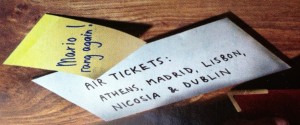I don’t know who does the covers for the Economist but s/he is a genius.
Consider this one on the issue of August 11-17, 2012.
It shows the German Chancellor pondering a question that must be on every Eurocrat’s mind, but one that nobody dares to speak about: whether to ditch the Euro, and if so how to do it. I’m willing to bet that every Finance Ministry in Europe has a bulging secret file on the subject.
What’s fascinating about the picture is the amount of narrative detail it contains. Here it is close up.
Note the detail. First of all, the ‘strictly confidential’ Cabinet file (though it’s in a Whitehall-style red leather binder; I suspect the German Chancellery favours dark green leather.)
Next to her left arm is an envelope containing the airline tickets to the various capitals that need to be visited bearing the bad news. And the post-it note revealing the increasingly desperate calls from Mario Draghi, the Chairman of the European Central Bank.
And then on the other side, the black coffee and whiskey needed to fortify her for the awful decision she will eventually have to make.
Not many magazine covers can stand this kind of exegesis. I hope that the Economist plans one day to have an exhibition of its best work. Some of us would pay good money for a signed copy of a cover like this.





